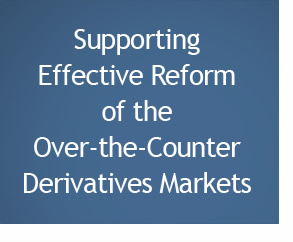01/11/11 - Dow Jones - By Katy Burne
|
|
ICE Trust Withdraws Swaps-Clearing Application
NEW YORK—A unit of IntercontinentalExchange Inc. dedicated to clearing credit derivatives has withdrawn an application it filed with the Commodity Futures Trading Commission to be a clearinghouse under the post Dodd-Frank financial regulatory regime.
ICE Trust filed the application on Nov. 12, but pulled it Thursday in response to recently proposed rules for derivatives clearing from the CFTC, a spokeswoman for the exchange said.
The company now has to revise elements of its credit derivatives clearing business model so it is compliant with rules that will reshape how the $583 trillion market for privately traded derivatives will be regulated once the Dodd-Frank Act is enforceable next year.
Setting up clearinghouses to guarantee swaps was a central plank of that law, as Congress wanted to reduce risk in the over-the-counter derivatives market after it was blamed for deepening the financial crisis.
The other key piece was language that will force swaps to be executed on exchanges or other trading platforms, and for prices to be publicly reported in real time; Currently they are known only to parties involved in bilateral negotiations.
The end goal of regulators was to see that swaps customers of all stripes are getting better prices and are able to make more-informed decisions about hedges to protect against price swings affecting their business.
ICE Trust isn't abandoning its clearing venture altogether, but likely wouldn't refile an application until rulemaking from the CFTC and Securities and Exchange Commission is further along.
Under the law, the CFTC will regulate swaps, and the SEC security-based swaps. The rules are to be in place by July 15, 2011, a year after Dodd-Frank was passed.
Last Thursday, the CFTC significantly lowered the barriers to entry in the derivatives-clearing business by voting in a proposal that clearinghouses wouldn't be permitted to set capital requirements on new members above $50 million.
ICE Trust currently requires members processing trades through clearinghouses on behalf of customers—commonly referred to as futures commission merchants—to maintain a minimum of $1 billion in adjusted net capital. Other participants not acting as FCMs have to have $5 billion in Tier One capital to clear credit derivatives through ICE. Tier One capital is a measure of a firm's financial strength used by regulators.
The CFTC proposal, which wouldn't be implemented until next year after a 60-day public comment period and subsequent vote, also would prohibit clearinghouses from requiring members to maintain a swap portfolio of a particular size or from setting transaction volume thresholds.
"The proposed participant eligibility requirements will promote fair and open access to clearing," CFTC Chairman Gary Gensler said at the hearing last Thursday.
The SEC hasn't provided parallel recommendations.
As a limited purpose New York trust company, ICE Trust is regulated by the New York Fed and New York State Banking Department. That oversight would end in July, with ICE Trust being regulated by the CFTC instead.
The company filed its application early to try to provide clarity on its business model for existing clearinghouse members, and to attract new members. Its aim was to speed up the process by which it could be registered as a clearinghouse with the CFTC.
Similar clearing offerings by the likes of CME Group, LCH.Clearnet Group and International Derivatives Clearing Group haven't submitted voluntary applications to the CFTC because they already are registered for the instruments they clear.
Since Dodd-Frank, all swaps that are standardized enough to be accepted by clearinghouses must be processed that way so that regulators can more closely monitor the market. Early estimates suggest at least 80% of the market could be cleared.
That means all firms offering to make markets in swaps will need a way of clearing those trades. Since they cannot self-clear trades and aren't members of clearinghouses, they would have to clear through the large Wall Street dealers that are already members of clearinghouses and which control their risk committees.
Those incumbent dealers have been accused of denying independent firms membership as a way of preventing them from being competitors in swap dealing, since clearing and execution go hand in hand under current clearinghouse rules.
The would-be market entrants formed a trade group called the Swaps & Derivatives Market Association to fight for equal access.
James Cawley, a co-founder of that association, wrote to the CFTC last week to complain about ICE Trust's clearing application, saying ICE's model wasn't compliant with provisions of the Dodd-Frank Act, which call for fair and open access.
He said ICE is using capital requirements on outsiders as an "anticompetitive weapon" to prevent independent agents from being able to profit from clearing.
He also complained that ICE requires all trades to go through a "participant" of ICE Trust—meaning one side of every trade has to be executed with an incumbent dealer in the clearinghouse, and trades between customers or dealers who aren't members are not allowed.
"Since participation in these auctions is a precursor to qualify to clear OTC swaps, this artificial construct of linking clearing to execution is deployed to limit independent clearing firm's participation," Mr. Cawley wrote.
The ICE spokeswoman said the clearinghouse will comply with all applicable rules once they have been finalized by regulators.
A CFTC spokesman had no comment on the withdrawal of ICE's application. |



